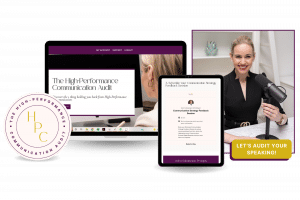Social Intelligence
Do you know the 4 styles of Verbal Aggression that can sabotage you at work?
Learn tips on how high performers handle verbal hostility with composure at work.

If you have been following me for quite some time now, you may be aware that we’re often talking about the communication traits you need to perform well at work. And we have yet to spend much time discussing the communication traits to watch out for.
So in this post, we will talk about the communication style high performers watch out for at work. If you’ve ever had to work with a challenging, abrasive, arrogant or aggressive person, this blog post is for you.
This blog post is best digested in 3 parts:
- Check the tips below.
- Watch the vlog for more detailed training.
- If you want to get a firmer grip on your delivery, speaking style and trust building when it comes to with difficult conversations at work, our High-Performance Communication Audit will give you deep insight into areas we can level up to expand your communication and presenting skills for entrepreneurship.
Prickly communicators make life difficult. They teach us how much our communication style matters to build a good reputation and make a solid impression at work. But how many of us get training and how to deal with verbally aggressive people? And heaven forbid, what do we do if we are at risk of being verbally aggressive?
There are research-based tools to level up your social intelligence, and today I will talk with you about verbal aggression. This is a communication style you must watch out for in others because it will sabotage your comfort and confidence at work. And if you’re delivering verbal aggression, keep reading because I’ve got some tips for you.
Verbal Aggressiveness
Regarding verbal aggressiveness, four negative behaviours can sabotage an interaction. These behaviours are based on some solid research by De Vries et al. I’ll outline how they occur, so you have a good sense of verbal aggression.
You probably know what it feels like when someone is verbally aggressive with you at work. But what will help you to self-regulate is if you can name the specifics of the behaviour. This will reassure you if you feel like someone’s gaslighting you or undermining you and you’ll be able to spot the symptoms of the behaviour. So you can then get a plan in place for your self-regulation which is vital for your reputation management at work.
Sometimes, our emotions overwhelm us, and we may also be at risk of verbal aggression. Unfortunately, verbally aggressive tendencies will make you less likely to be trusted. That one event where you’ve blown up or exploded at work or made a derogatory remark could impact your career plans long-term, especially if you’re aiming to be a leader. So if you’re setting your sights on your first promotion into a management position, watch out for your behaviour reflected through your communication. Your opportunities will plummet if you don’t play the game by the rules of trust-building, rapport-building and impression management.
Let’s get into the four behaviours of verbal aggression which drop rapport, trust and influence so that you know the signs and symptoms ready to respond if you’re on the receiving end.

#1 Angriness
Our first behaviour will come as no surprise, which is the behaviour of anger. When we’re angry, we lose the capacity to self-regulate. It will usually result in a vocal, audible loud outburst matched by fleeting, aggressive facial expressions like dominating eye contact, intimidating posture, and reckless words that would impact the respect we should show for our conversation partner.
#2 Authoritarianism
Behaviour number two is authoritarianism. So if you’re in that emerging leader position where you’re on the way, hoping someone will notice you, take care not to be too overpowering. According to research, being too authoritative these days will definitely register as something that will reduce trust with conversation partner. Instead focus on using mutuality to build rapport, to assist, serve and influence people in a way that’s not didactic, aggressive, or arrogant. Authoritarianism will get in the way and will pass off as aggression.
#3 Derogatoriness
Derogatory people make side remarks that seek to undermine another person’s validity, reputation, and credibility. So if you’re working with a colleague or have a contact you don’t respect and trust, be careful of your verbal behaviours and body language. Always show professional respect.
It’s okay not to like people. Putting people in the “too hard to communicate with” basket is OK. But we have to show professionalism when we’re at work. If you want to showcase your leadership potential, you must learn to communicate tactfully, politely – these are the properties of the leadership stance.
Ideal leaders show respect to everyone, regardless of their behaviour and how irritated they are by their team members. They’ll always hold space and empathy to register the behaviour and react in a firm, professional manner, but not in a derogatory way. Take care of sarcasm, in-house jokes, snide remarks, personal attack, eye-rolling, and in-house gossip – all of these behaviours are negative, and high performers simply opt-out of participating in this manner.
#4 Non-Supportiveness
Our last behaviour of verbal aggression is non-supportiveness. There are many ways in which non-supportiveness registers. Firstly, it can arise he form of ghosting emails, or being exclusive with who you sit with, get a coffee for, or crack a joke with. Leaders and people who show leadership potential can bind a team together. So showing acts of support towards your colleagues or even your boss or people around you that you interact is the best way to progress as a high-performance communicator.
Now, here is the big question.
Full disclosure, we’re all human. Let’s acknowledge the fact that no one is perfect. But also take a moment for some self-reflection on these four negative behaviours. Reflect on what has been outlined so far: angriness, authoritarianism, derogatoriness, and non-supportiveness. Next, ask yourself two questions:
Question Number One:
“are you at risk of engaging at work in any of these behaviours?”
If so, get on top of it, and access some self-regulation strategies.
You might like to check these helpful guides to get started:
- The 5-Step Process to Improve Your Emotional Intelligence in Leadership or At Work – read more here
- How to Unblock Toxic Communication Barriers at Work – read more here
- Got an angry client or customer? Read this helpful guide for how to de-escalate conflict.
Question Number Two:
“Are you experiencing any of these verbally aggressive behaviours at work? Are you on the receiving end?”
If so, I’ve got a quick tip for you. If someone is making a verbally aggressive remark in your direction or behaviour, you can open an inquiry with a rhetorical question and effectively disarm their behaviour.
Dealing With Aggressive Remarks
For example, take a scenario where someone undermined your work. Maybe they said something like:
“You know what, that was a ridiculous idea”,
or something of that nature.
When you hear a comment like that, it will slow you down. You might get stuck with your words. You might start to show negative body language that reduces how confident you look. You may even begin to racing with your thoughts and need help with how to advocate for yourself.
In this instance, one of the best ways to self-regulate is to get that speaker talking more but to direct the conversation rhetorically by opening their perspective and making an inquiry. This inquiry sets your boundaries and shows them that you noticed. So when that snide remark falls, you’ll ask an open question.
“Oh, that’s an interesting comment. Can you tell me more, or I never thought of it from that perspective.”
“Tell me more. I’d like to know more about your perspective on that comment.”
At this moment, you’ll catch the verbally aggressive person off guard. They’ll not expect a reaction of this nature, especially if they’ve been getting away with it for some time. So when your thoughts are racing, you don’t know what to say when someone is undermining you. Ask that rhetorical question. Don’t react with a verbally aggressive remark.
Dealing With Difficult Colleagues
Suppose you’re dealing with a difficult colleague. In that case, you’ll want to build up your speaking and language skills to show up with confidence, a professional touch, and consistent self-regulation because you’re an exemplary professional.
How do professionals achieve effective communication at work a quick and easy way? You can only learn to speak confidently with anyone anywhere if you have the tools to transform your speaking logic and habits. And the High-performance Communication Audit shows you how this science-based communication service helps you speak with more clarity, charisma and confidence.
You can learn the key leadership priniciples to focus on to be noticed as a potential leader
And it starts with optimising your leadership communication skills.
I have some exciting news for you!
I want to invite you to attend a new Leadership Communication Class, which is coming soon. Now, as you know, I don’t release free classes very often, so I recommend you sign up for the class so that you don’t miss out on some incredible training that will change your career for the better.
Check the details below:
Free Class
Communication Class for Emerging Leaders

Inside, I’ll show you precisely what you need to do to showcase your skills as an emerging leader even if you’ve not been given a chance at a management position.

References
-
de Vries, R. E., et al. (2009). “The Content and Dimensionality of Communication Styles.” Communication Research 36(2): 178-206.
Did you enjoy this post? Make sure to subscribe to our YouTube channel to get more content to increase your communication skills!
About the Author
Dr Sarah Lobegeiger de Rodriguez is a Keynote Speaker, Executive Speaking Coach, and Opera Singer who likes to play with words, sounds, and your impact.
Her academic background is in Music Performance, Communication Science and Speech & Language Pathology. She assists executive communication clients all over the world as a communication consultant with strong expertise in CEO, Founder and Entrepreneur communication strategies.
Connect with Sarah on LinkedIn.
© CADENZA
Level 14, 380 St Kilda Road, Melbourne, 3004
Privacy Policy
Terms & Conditions
Position Statement on Racism

